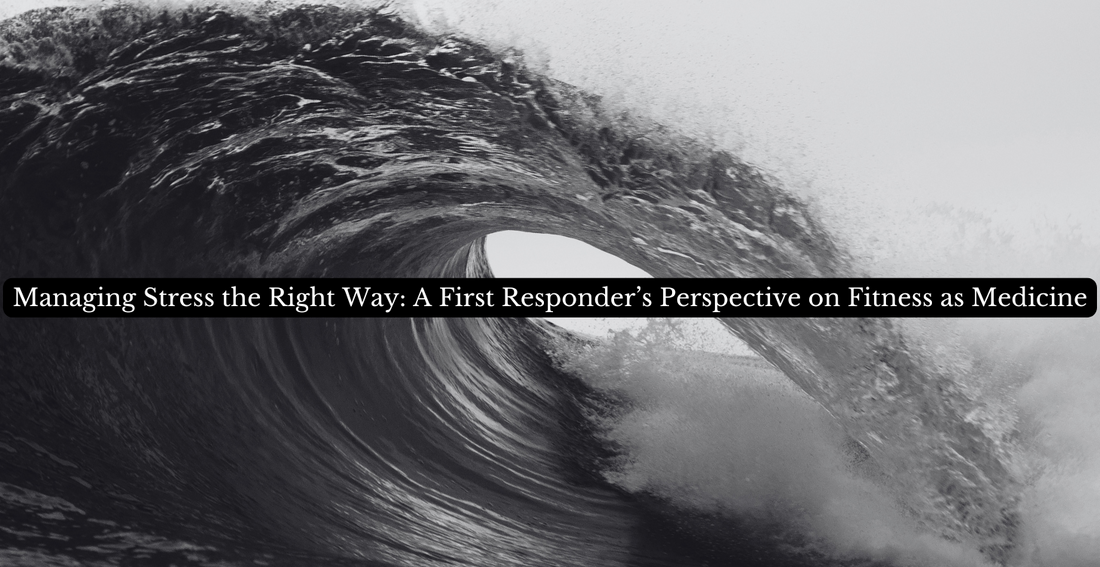
Managing Stress the Right Way: A First Responder’s Perspective on Fitness as Medicine
Share
Managing Stress the Right Way: A First Responder’s Perspective on Fitness as Medicine
As a first responder, stress isn't just an occasional thing—it’s part of the job. We carry the stories most people never hear, and we’re expected to be the calm in the storm no matter what’s going on around us. That pressure builds. And if you don't find a way to process it, it’ll break you down.
Over the years, I’ve seen too many good men crumble under the weight. I knew early on that I needed an outlet—something to keep my head and heart clear. For me, that outlet has always been fitness.
Fitness First: Why Movement Is My Medicine
Exercise isn’t a hobby—it’s a lifeline. I’ve found that training gives me more than just physical strength. It clears the fog. It gives me a place to offload all the chaos from the shift before. When I train, I’m not just building muscle—I’m taking control of my mental state.
And the science backs it up: regular physical activity reduces stress hormones like cortisol and adrenaline, and increases the brain’s feel-good chemicals—endorphins, dopamine, and serotonin [1]. That’s not just a mood boost—it’s biology working in your favor.
Mental Clarity Through Movement
Stress messes with your ability to think straight. It hijacks your nervous system and can even shrink parts of your brain like the prefrontal cortex—the part that helps with decision-making and emotional control [2]. And let’s be honest, when you’re working in high-pressure environments, you can’t afford to be foggy.
Fitness helps reverse some of that damage. Studies show aerobic exercise boosts BDNF (brain-derived neurotrophic factor), which improves focus, memory, and emotional resilience [3]. In plain terms? Moving your body helps your brain stay sharp.
Weight Training: Structure in the Chaos
Resistance training has always been my anchor. It’s where I find structure when everything else feels unpredictable. And beyond the discipline and drive it builds, lifting weights has been shown to help reduce symptoms of depression and anxiety [4].
For guys like us, it’s powerful to know that even when the world’s out of control, you can control your effort, your reps, and your progress. That mindset spills over into life.
Real Talk on Sleep and Nutrition
Now let me keep it real—my sleep and diet aren’t perfect. Shift work, late nights, family life... it all adds up. But I do what I can when I can. I don’t believe in perfection—I believe in doing better where you can.
I’ve learned that even small adjustments—like staying hydrated, cutting down on processed stuff, or getting to bed earlier a few nights a week—can make a difference. Poor sleep has been linked to higher stress, worse mood, and reduced recovery [5], so when I can catch good sleep, I protect it.
But I don’t beat myself up when life gets in the way. I just get back on track the next chance I get. That’s what long-term resilience looks like.
Don't Just Train the Body—Train the Mind
Training gives us an entry point, but it’s not the full picture. I’ve found a lot of value in small things like deep breathing, walking outside without headphones, or even writing down what’s bothering me. It’s not weak—it’s maintenance. And when you're responsible for others, you better be maintaining yourself.
Final Thoughts
Stress is part of the game, but being crushed by it doesn’t have to be. Fitness is my tool—not because it solves everything, but because it helps me stay grounded. It helps me show up for my family, lead with clarity, and walk through the fire without losing myself.
You don’t need to be perfect. You just need to keep showing up. Move your body, clear your mind, and keep pushing. You’re not alone in the fight—and the fight is worth it.
Sources:
[1] Salmon, P. (2001). Effects of physical exercise on anxiety, depression, and sensitivity to stress: a unifying theory. Clinical Psychology Review, 21(1), 33-61.
[2] Arnsten, A.F.T. (2009). Stress signalling pathways that impair prefrontal cortex structure and function. Nature Reviews Neuroscience, 10(6), 410-422.
[3] Szuhany, K.L., Bugatti, M., & Otto, M.W. (2015). A meta-analytic review of the effects of exercise on brain-derived neurotrophic factor. Journal of Psychiatric Research, 60, 56–64.
[4] Gordon, B.R. et al. (2018). Association of Efficacy of Resistance Exercise Training With Depressive Symptoms: Meta-analysis and Meta-regression. JAMA Psychiatry, 75(6), 566–576.
[5] Meerlo, P., Sgoifo, A., & Suchecki, D. (2008). Restricted and disrupted sleep: effects on autonomic function, neuroendocrine stress systems and stress responsivity. Sleep Medicine Reviews, 12(3), 197-210.
